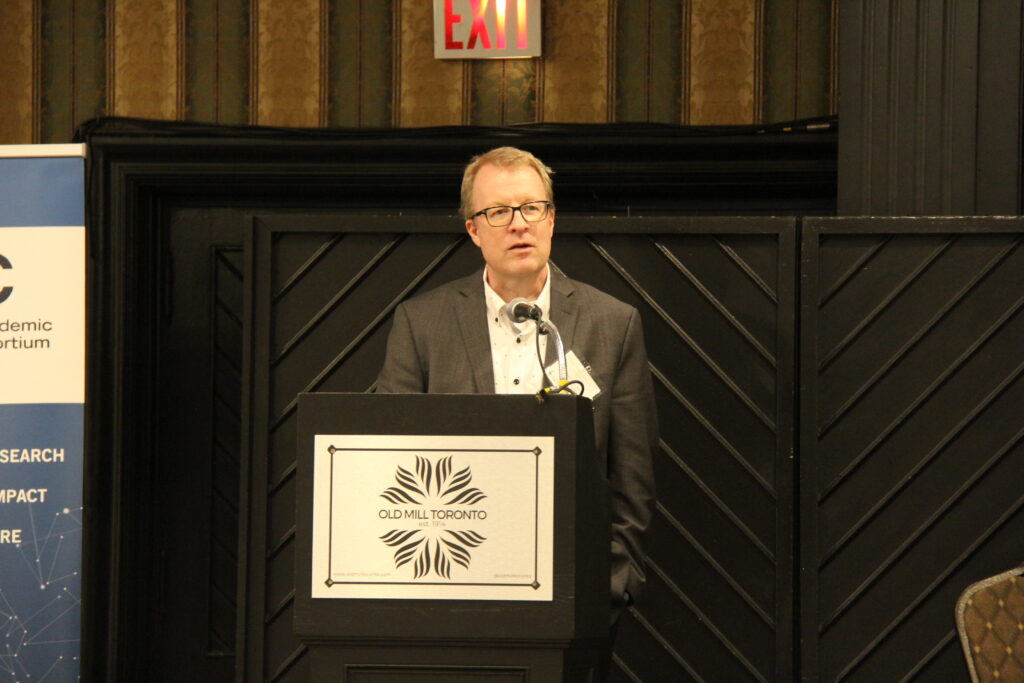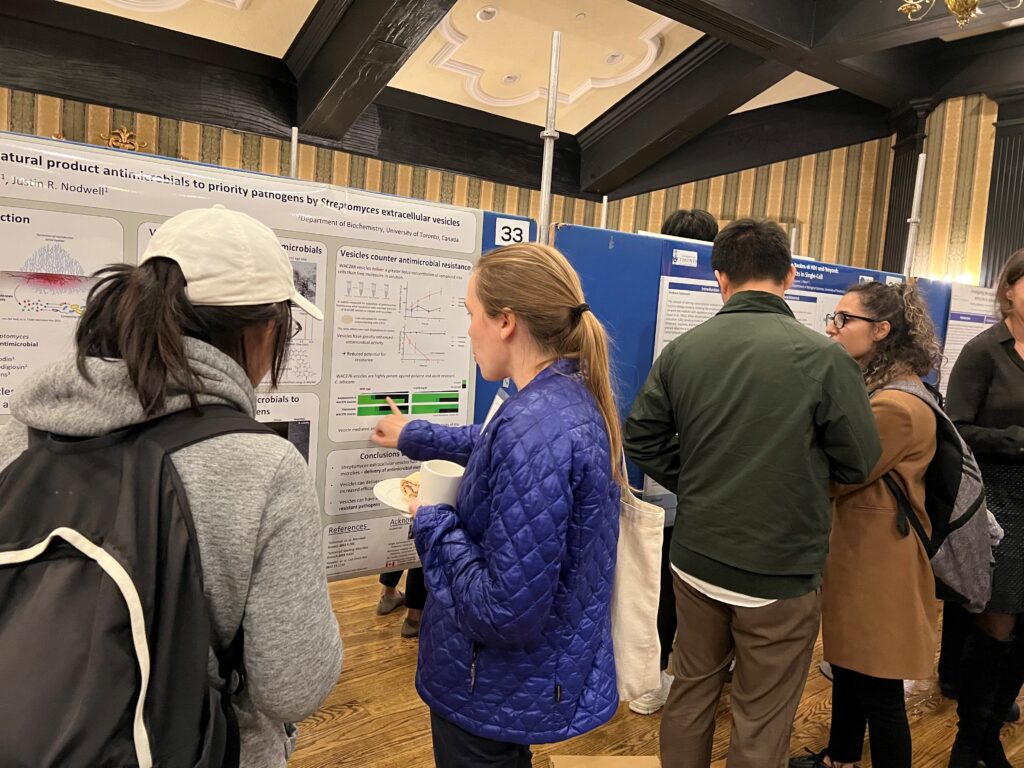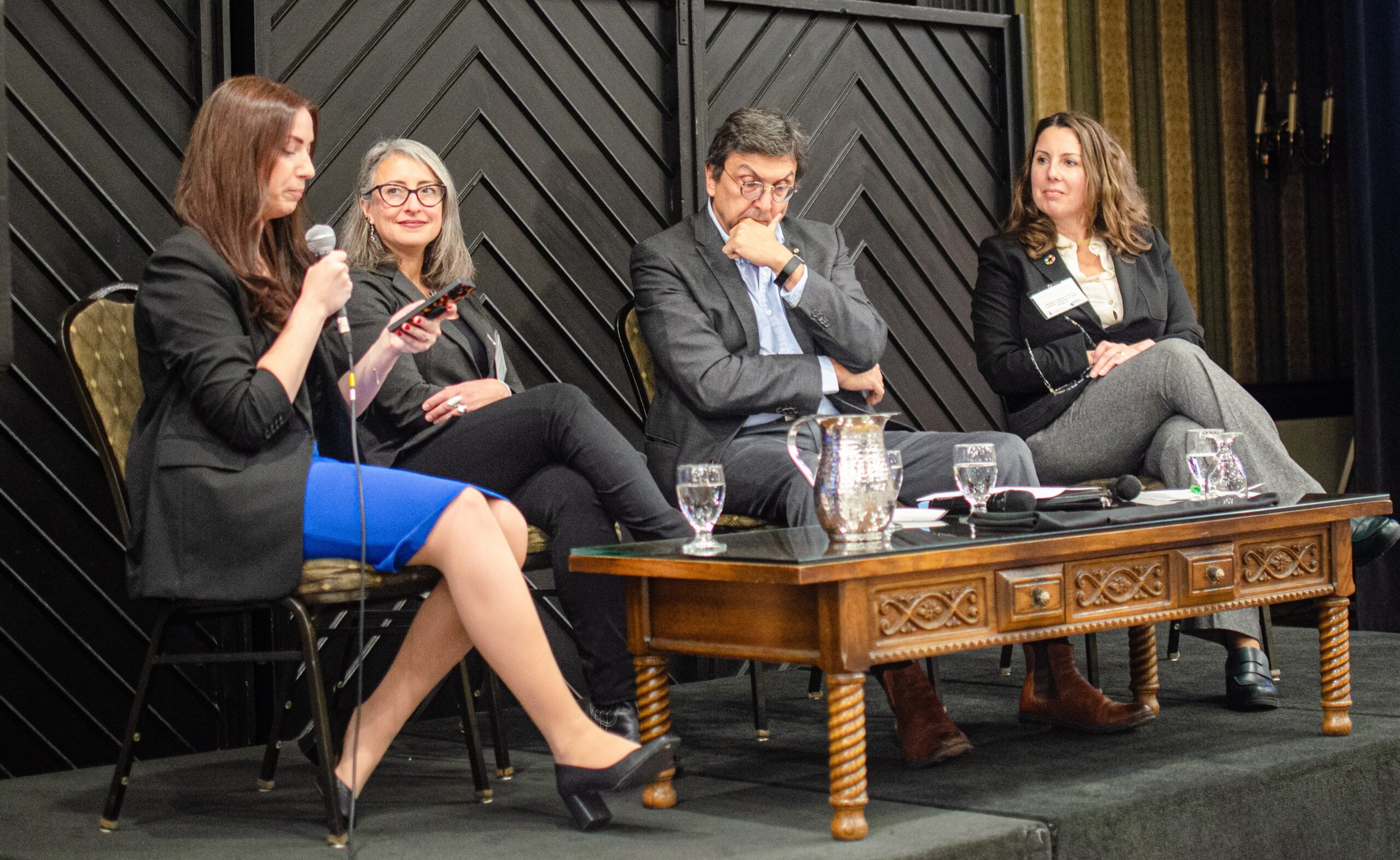From left to right: Lauren Pelley, Leah Cowen, David Naylor and Marisa Creatore (Photo credit: Taylor Kain)
November 1, 2023
By Betty Zou
A panel of experts called for sustained funding investments, stronger ready-to-use infrastructure and improved communications to help Canada break the cycle of panic and neglect around infectious diseases.
These themes emerged from a discussion at the first annual Emerging and Pandemic Infections Consortium symposium held in mid-October. The panelists included Leah Cowen, vice-president, research and innovation, and strategic initiatives at the University of Toronto, Marisa Creatore, executive director of the Centre for Research on Pandemic Preparedness and Health Emergencies at the Canadian Institutes of Health Research, and U of T President Emeritus David Naylor.
In particular, Naylor highlighted that research funding in Canada has fallen far behind investments made in other G7 nations and advocated for consistent, steadily increasing support for independent and open research to drive innovation. As an example, he pointed to Germany where their national research organizations have received a 3% budget increase every year since 2006. “We have to push for all of science to be lifted, including the social sciences and humanities,” he urged.
He also highlighted the need to ramp up domestic biomanufacturing capacity and to have decision-making infrastructure in place so that the country can respond more quickly to emerging infectious threats.
Despite the funding challenges faced by many researchers before and during the pandemic, Cowen pointed out that the Canadian scientific community produces “phenomenal research outputs” — a testament to the talent and collaboration among researchers.
Creatore also stressed the importance of working closely with communities and taking an equity-centered approach in planning and responding to future outbreaks, a sentiment that was echoed during the morning’s research talks.
All three panelists underscored the importance of effective ongoing communications with policy makers to guide decision-making during an emergency and advocate for sustained support in the interim, and with the public to better tackle misinformation.
Communications and storytelling were also the key themes of Lauren Pelley’s keynote presentation. Pelley, who is a senior health and medical reporter at the CBC, shared the lessons she learned from reporting on the pandemic’s front lines. She reminded attendees to look to the past to inform how we communicate about the present, to always follow the science and communicate clearly, and to engage and inform the audience by highlighting the uncertainties and what remains unknown.
The sold-out symposium brought together close to 200 trainees and researchers from across EPIC’s partner institutes — the Hospital for Sick Children Research Institute, Lunenfeld-Tanenbaum Research Institute at Sinai Health, Sunnybrook Research Institute, Unity Health Toronto, the University Health Network and U of T. Representatives from industry and local, provincial and federal public health agencies were also in attendance. For many attendees — including the 11 new faculty members who took part in a lightning presentation round to introduce themselves and their research — the event was a unique opportunity to make new connections and learn about the breadth of infectious disease research taking place across the city.
In a session focused on emerging pathogen surveillance and response, Jonathon Kotwa, a postdoctoral fellow at Sunnybrook Research Institute, shared his work on detecting alphacoronaviruses in bats in Eastern Ontario. Darrell Tan (Unity Health Toronto) and Upton Allen (SickKids) both highlighted the vital role that community engagement played in the impactful responses to the mpox outbreak in the gay, bisexual and men who have sex with men community and to the COVID-19 pandemic in the Black community, respectively. The session also included talks by Vanessa Allen (Sinai Health) on building systems of surveillance and response to emerging infections in pregnant people and by Keith Pardee (U of T) on using synthetic biology to build low-cost diagnostics for disease surveillance.
The second session of the day was about the development and implementation of innovative countermeasures against infectious diseases. Christina Guzzo (U of T Scarborough) and Michael Litvack (SickKids) presented their research on virus-based therapies to target HIV and stem cell-based cell therapies to treat pulmonary viral infections, respectively. On the topic of COVID-19, Tania Watts (U of T) highlighted the importance of tracking T cell responses to understand immunity elicited by SARS-CoV-2 infection or vaccination, while Haibo Zhang (Unity Health Toronto) shared recent studies from his lab uncovering the role of the ACE2 receptor in sex differences in COVID-19 outcomes. Finally Ben Hatton (U of T) shared an engineering perspective on developing bio-inspired surfaces to prevent microbial contamination and transmission.
The symposium closed with a networking reception and a poster session where close to 50 trainees showcased their work.
“One of our goals for EPIC is to build connections and community,” said Scott Gray-Owen, EPIC’s director and professor of molecular genetics at U of T’s Temerty Faculty of Medicine. “It was thrilling to see the animated discussions and new relationships fostered during this year’s symposium, allowing our members to exchange ideas and learn from each other. These interactions are the foundation of a dynamic and collaborative ecosystem that creates innovative solutions and inspires a new generation of broad-thinking infectious disease leaders who can effectively address future emerging infectious threats.”





